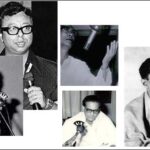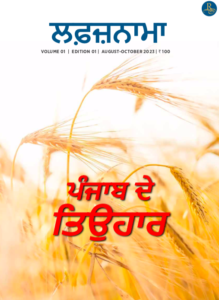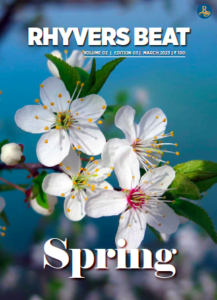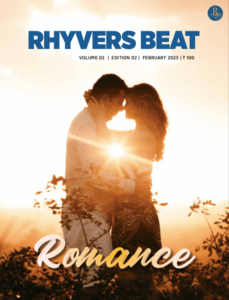Composers sing for themselves: Ten songs
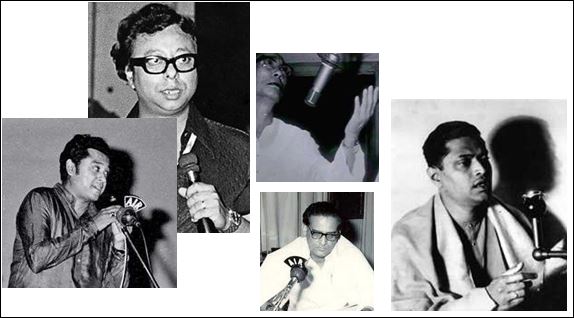
No, I don’t mean all those many renditions of Mae ri or Naina barse that one comes across, sung by Madan Mohan himself. I mean instances where a composer actually recorded—and it was included in the film in question—a song in his/her own voice.
This idea popped into my head one day when I was watching Baradari and came across a song that Nashad (the composer of the film’s score) sang in his own voice. It made me wonder: were there other composers, too, who had sung songs for their own films (I cannot, offhand, think of any composers—not also major playback singers—who have sung for other composers. SD Burman singing for RD Burman’s music is perhaps one of the exceptions). Of course, some names immediately came to mind: SD Burman, naturally, since I love his voice so much. RD Burman, who was also a good singer. Nashad, since his song had been the one that had sparked off this idea in the first place.
And, quickly, one after the other, more songs, more singers/composers, followed. So here it is, my list of ten songs that were both composed by and sung by the same person. As always, these are all from pre-1970s films that I’ve seen.
1. Chali woh naseeb ki aandhiyaan (Baradari, 1955): Nashad. Sadly, far too many people confuse this composer with the far more famous Naushad. But Nashad—Shaukat Dehlvi Nashad, to give him his full name—was a composer in his own right. His may not have been anywhere near the stature of Naushad, but Nashad did compose songs for several films, including Saalgirah, Zindagi ya Toofaan, and Baradari. Baradari, which included hits like Bhula nahin dena and Tasveer banaata hoon, was undoubtedly Nashad’s biggest success. Among its many songs was this plaintive one of parting, sung by Nashad himself. A background song picturized on a young woman being sent off to marry a stranger while the man she loves looks on, Chali woh naseeb ki aandhiyaan is poignant, and made more so by the desperation and loneliness in Nashad’s voice.
2. Mere saajan hain us paar (Bandini, 1963): Sachin Deb Burman. SD Burman, as I’ve mentioned, was the first name that came to my mind when I thought of composers singing. Burman Da’s voice had a raw, rustic feel to it that suited perfectly the plaintive, poignant songs that featured in several of the films for which he composed music. Suited them so much, really, that when I listen to a song like Wahaan kaun hai tera musaafir or Doli mein bithaaike kahaar or Allah megh de, I am convinced that nobody else could have done justice to the song the way SD Burman does. Of all the songs he’s sung, the one I like the best (though it’s a close fight) is this one from Bandini. A touching and sad song of parting, of saying goodbye to a life and a love one cannot ever forget. The words are haunting, SD Burman’s music is flawless, and his voice makes Mere saajan hain us paar unforgettable.
3. O meri jaan maine kaha (The Train, 1970): RD Burman. Like father, like son. But also not like father, like son. Just as SD Burman had a brilliantly distinctive voice that lent itself very well to a certain kind of song, so did RD Burman—and yet their styles and their voices are very different (at least to an untrained ear like mine). Not for Pancham the raw, haunting notes of his father’s voice: his is the full-throated, powerful and carefree voice that makes Mehbooba mehbooba such a smash hit (and which also makes the very different Dhanno ki aankhon mein raat ka surma come alive).
It was really in the 70s that RD Burman came into his own as a singer, singing large sections of songs by himself; in contrast, the few songs that he sang in the 60s and in 1970 are mostly sung by another (invariably Asha Bhonsle) with Pancham lending a contrast in vocals here and there. As in O meri jaan maine kaha, where—though he begins the song, with that panting, almost lusty voice, it’s soon taken over by Asha. He still comes in at the refrain, and it’s an interesting touch—a vivid, throaty contrast to Asha’s sultry sweetness. An inspired bit of singing (not to mention music).
4. Shaam dhale khidki tale (Albela, 1951): Chitalkar Ramachandra. When it comes to composers who often sang songs for their films, C Ramachandra’s name should be right up there at the top of the list, alongside SD Burman. And in one respect, I think Chitalkar Ramachandra outdoes SD Burman when it comes to singing: he’s very, very versatile. On the one hand, he sings a patriotic song like Kadam-kadam badhaaye jaa so stirringly; on the other, he pretty much passes off as a very romantic-voiced Talat in Kitna haseen hai mausam. And in Albela, singing playback for Bhagwan all through the film, Chitalkar is romantic, funny, or poignant, as the situation demands. I was inclined to choose my favourite song from the film—Shola jo bhadke dil mera dhadke—but decided that would be predictable. Therefore, another Albela song I love, because it’s so much fun, teasing and playful and romantic, all at the same time. And how well the voices of Chitalkar and Lata vibe!
5. Tum pukaar lo (Khamoshi, 1970): Hemant Kumar Mukherjee. This one was possibly the most difficult song to pick in all this list—because Hemant didn’t just have a wonderful voice but was also a superb composer. In films like Bees Saal Baad, Anupama, Kohraa, Khamoshi, Sahib Bibi aur Ghulam, Jagriti and Anandmath, he composed songs that would far outlive him—and he sang hundreds of songs, both in his own films as well as for other composers: songs that I sometimes feel couldn’t have been sung by anyone other than Hemant himself. Where does one begin to select a song from all those many which I love that have been both composed as well as sung by Hemant?
So, this song. Composed by Hemant, Tum pukaar lo is one of those songs that, to me, are sublime. The ache in Hemant’s voice, the barely-contained passion and longing, the impatience… and that velvety, gorgeous voice. Stunning.
6. Koi humdum na raha (Jhumroo, 1961): Kishore Kumar. Like fellow Bengali Hemant, Kishore too was both a singer as well as a composer (and, like Hemant, also a film producer and director). Unlike Hemant, though, Kishore was also an actor, and one who focused on his acting rather than his singing in the early part of his career. In 1961, however, he was roped in to compose the music for the S Mukherjee-directed Jhumroo, in which Kishore was also the leading man. Jhumroo had several great songs, including the lovely (albeit heavily ‘inspired’) song Thandi hawa yeh chaandni suhaani. Another favourite of mine is this beautiful song of despair and loneliness, its music subdued and melodious, Kishore’s voice controlled, soft and poignant.
(Interestingly, this song wasn’t originally composed by Kishore; he ‘lifted’ its tune, words, and all, from a song sung by elder brother Ashok sung in the 1936 film Jeevan Naiyya—if you want to hear it, check out this version, which also includes a delightful introductory anecdote by Dada Moni himself. The creator of this tune was one of the few women composers of Hindi cinema, Saraswati Devi).
7. Kismat ke khel niraale mere bhaiyya (Ek Phool Do Maali, 1969): Ravi. I will admit that when I watched this film several years back, I didn’t really pay much attention to the credits song. Yes, it registered, but not as much as the other, much more popular, songs of the film. It was only much more recently that blog reader swarint brought it to my notice that the singer was the composer himself, Ravi. Listening to the song all over again, it struck me how several composers—barring people who were equally famous as singers, like Kishore Kumar or Hemant—seem to have sung mostly philosophical songs. SD Burman, Nashad, and here, Ravi. I wonder why? Perhaps because the average composer’s voice may not always fit a hero, but would be perfect for a background song or for one sung by a wandering fakir?
At any rate, Kismat ke khel niraale mere bhaiyya is a nice enough song—and Ravi sounds, at least in the lower notes, somewhat like Rafi (that, given that Rafi could sound like many different people in many different songs).
8. Ae jaan-e-wafa maine dil rakh diya (Nishaan, 1965): Usha Khanna. In a world dominated by male composers, Usha Khanna was a woman who held her own. It wasn’t as if she was the only female composer Hindi cinema has known—there were others before her, and there have been others after her—but from the 60s onwards, Usha Khanna certainly made a name for herself by composing some great songs, including the title song of Hum Hindustani.
She also sang in several films, both for other composers as well as for herself. As blog reader Bhagwan Thavrani rightly pointed out, most of the songs Usha Khanna sang were duets or trios: solos were rare. The 1965 Sanjeev Kumar-starrer Nishaan, for which Usha Khanna composed the popular and romantic Haaye tabassum tera, also featured this song, sung solo by the composer herself. Picturized on a pretty Helen, it’s a fairly standard staged performance: a court dancer, with a bunch of extras, sings and dances for the crown prince, unaware that he is not her lover but his identical twin.
9. Jamuna tat Shyam khele Holi (Aurat, 1940): Anil Biswas. Anil Biswas holds a very special place in the annals of Hindi film music, because he did not just compose great music, he was also a pioneer of playback singing. It was thanks to Anil Biswas that several of Hindi cinema’s most renowned playback singers, including Mukesh, Zohrabai Ambalewali, and Begum Akhtar. Besides this, he also mentored Lata Mangeshkar, Talat Mahmood and Meena Kapoor. Anil Biswas’s deep understanding of what it took to render a tune, the vocals involved, not just the instrumentals, is also reflected in the songs he sang.
From the songs Biswas sang in several films across the 40s, 50s and 60s, here is one from Mehboob Khan’s original Mother India: Aurat.
In a story that was pretty much unrelentingly joyless and tragic, this was one bright spot, a few moments of celebration as the farmers and their families play Holi. With gulaal and colours flying here and there, the people sing and dance. Much of the song is sung by a choral group, but Anil Biswas (and Sardar Akhtar herself? I’m not sure) sing the stanzas. A lovely folksy song.
10. Aayi bahaar aaj aayi bahaar (Doctor, 1941): And, to end this list, a song by someone who, though he is today remembered primarily as a composer and a singer, was also an actor. Mullick was an important exponent of Rabindrasangeet, and is also credited with being one of the pioneers of playback singing in Hindi and Bengali cinema. The 1941 film Doctor, which was made in both Bengali as well as Hindi, was a Calcutta production (even its censor certificate was from the Bengal Board of Censors). Pankaj Mullick composed the music for this film, sang several of the songs, and acted the part of the eponymous doctor, the upstanding and just Dr Amarnath Roy. The doctor gets to sing several songs in the course of the film, and for me, the toss-up was between the lovely Chale pawan ki chaal, and this one, a train song that begins the story. I have loved Aayi bahaar from the first time I heard it: the way Mullick blends the rhythmic rumbling of the train’s wheels with the tune is truly inspired. Wonderful.
Which are your favourite songs of this type? Please share!















